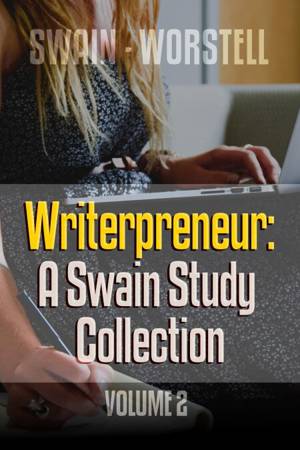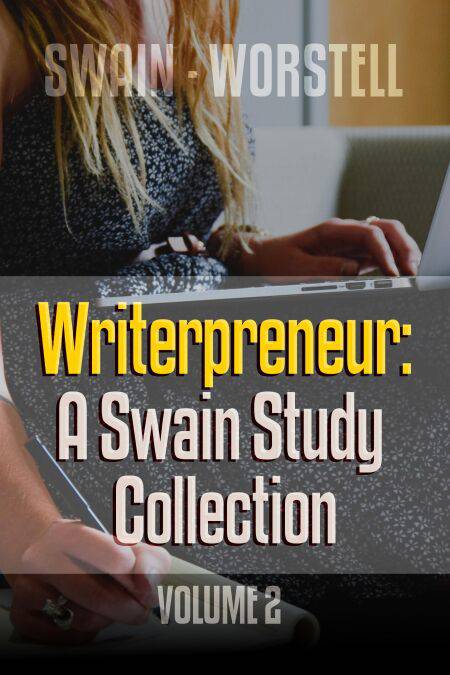
- Retrait gratuit dans votre magasin Club
- 7.000.000 titres dans notre catalogue
- Payer en toute sécurité
- Toujours un magasin près de chez vous
- Retrait gratuit dans votre magasin Club
- 7.000.0000 titres dans notre catalogue
- Payer en toute sécurité
- Toujours un magasin près de chez vous
Writerpreneur: A Swain Study Collection Volume 2 EBOOK
Writerpreneur Guides, #9
Dr. Robert C. Worstell, Dwight V. SwainDescription
This book started as a search for stories authored by the instructors for the probably all-time most successful writing course in the world. All as a comparison of how they "walked their talk."
Of the three instructors who were foundational to the OU Professional Writing curriculum heyday, this book is focuses on the discovery of eight stories published by Dwight V. Swain after he signed onto the OU team as an instructor.
Swain's first published fiction work was in 1941, but after WWII he felt the need to "burnish the rust of the war years off my own techniques." He longed to get back inno the steady production of pulp fiction.
So he signed up for a short summer course at OU. The exposure to training from Walter S. Campbell and Foster Harris was unique and valuable, but it was his close-shouldering with the other students that made him remark,
"Best of all was my association with the other members of the class. Most of them were veterans like myself, and all were imbued with a wonderful fierce determination to become writers, no matter how long or hard the road. Night and day they wrote, wrote, wrote. And when they were not actually writing, they were studying it or talking about it."
Returning home, he soon was back at his pre-war stride once more.
Keeping track of his fellow classmates over the years following, he was astonished at what they accomplished with their training. Many were regular contributors to the major "slick" magazines such as Colliers and the Saturday Evening Post. Their books were also being regularly published.
He had underestimated how a short period of training could be so effective.
"It was incredible. No matter how competent the Campbell-Harris team might be; regardless of the effectiveness of their methods, I still found it hard to understand how any course could turn virtual beginners into selling writers in so short a time. I knew that most college writing courses would have been shocked and delighted at even one sale a year. Yet the successes I have mentioned were only those of my own particular friends. In spite of relatively small classes, literally dozens of other Campbell-Harris students of the period were selling also.
"The more I thought about it, the more curious I became. Increasingly, I pondered as to just what unique touch or approach or technique or theory it was that distinguished OU's professional writing courses from the others. I even promised myself that if I ever had the time and opportunity to investigate them properly, I'd make it a point to find out the how and why of their achievement."1
In 1951, he got that chance. Swain was invited onto the faculty to substitute for Foster Harris, who was facing a long convalescence. After Harris returned, Swain remained on the faculty.
This short set of Swain's science fiction stories was selected so you could follow Swain's own approach to writing, in light of what he had learned while teaching his students at OU.
These stories are in their published order as they appeared in various pulp magazines of their day.
You can now use what you've learned of dissecting stories in order to discover and extract the technical devices Swain used as a professional author.
I've included the core of Campbell's chapter on Reading for Technique in the Appendix as a refresher.
It's also expected that you've studied the other books in this Writerpreneur series, particularly The Basic Formulas of Fiction. That last covers Foster Harris' approach and also includes a short talk transcript by Swain which explains the basic approaches he used in his own writing, and taught to students. That should hold you while I'm hard at work on a review/study guide for Campbell's four out-of-print textbooks – and so fill in that gap.
This is the second of two volumes, following their chronological order of publishing.
Good Hunting.
Spécifications
Parties prenantes
- Auteur(s) :
- Editeur:
Contenu
- Langue:
- Anglais
- Collection :
Caractéristiques
- EAN:
- 9798230060390
- Date de parution :
- 17-12-24
- Format:
- Ebook
- Protection digitale:
- /
- Format numérique:
- ePub

Les avis
Nous publions uniquement les avis qui respectent les conditions requises. Consultez nos conditions pour les avis.






